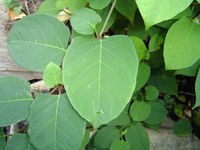 Add My Company
Add My Company
Sign In
Japanese Knotweed and The Law
27-05-2011

Separate the Facts from the Fiction
Japanese Knotweed can, in most cases, be treated effectively and often relatively quickly despite its fierce reputation. However, most people are unaware of the legal implications surrounding Knotweed and what the law requires in stopping its spread to others’ land or the redress you have if somebody has allowed JKW to invade your property.
There is various legislation in place which regulates and controls the planting and disposal of Knotweed. Section 14 of the Wildlife and Countryside Act 1981 makes it an offence to plant or otherwise cause Japanese Knotweed to grow in the wild.
Under the Environment Protection Act 1990 all soil containing Japanese Knotweed roots/rhizomes is classed as controlled waste. This must be disposed of at a licensed landfill site.
The Town and Country Planning Act gives local authorities power to require landowners to treat land if it detracts from local amenities. The Act is often used by local planning authorities to force developers to treat sites infested with JKW.
These Acts can give rise to criminal prosecutions between private landowners where Knotweed spreads from one parcel of land to another. The relevant law here is private nuisance. A private nuisance is an act or omission which is an interference with, disturbance of or annoyance to a person in the exercise or enjoyment of his ownership or occupation of land.
A landowner will require his neighbour to treat Knotweed on the neighbour’s land in order to abate the nuisance and deal with the JKW problem. If the neighbour fails to cooperate a legal action may be started seeking various remedies. These include damages equating to the cost of the Japanese Knotweed treatment and possible diminution in the value of his land – also injunctions forcing the neighbour to carry out specific treatment methods.
A landowner must take all reasonable steps to prevent a nuisance.
Factors to be taken into account may include the extent of the spread of JKW, the probable damage and the cost of treatment. Indeed, a landowner can be liable for allowing a nuisance to continue even if he did not create it and was not his fault and came after the Knotweed was established.
Buyers of land should always have the land properly surveyed before buying. Although he will not be responsible for past damage he will be liable for continuing damage and the likelihood of a claim against for an injunction.
Sellers could remain liable for damage caused prior to the date of sale. He could be guilty of a misrepresentation to a buyer if he has not responded correctly to any pre-contract enquiries concerning the presence of nuisance – ie Japanese Knotweed.
For further advice, please contact Herpetosure Invasive Solutions Ltd on 01664 444660.
For more information on Japanese Knotweed and The Law talk to Herpetosure Invasive Solutions Ltd
Enquire Now
List your company on FindTheNeedle.
